Paul Levinson's Blog: Levinson at Large, page 216
June 5, 2017
Review of Rob Sheffield's Dreaming The Beatles 6 of X: The Case for Ringo
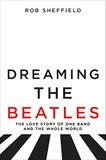 Rob Sheffield makes the case for Ringo in the next chapter of his stellar Dreaming the Beatles, putting the question regarding Ringo as whether he was an all-time genius drummer who made the Beatles possible, or "a clod who got lucky, the biggest fool who ever hit the big time". Sheffield puts his chips on the genius.
Rob Sheffield makes the case for Ringo in the next chapter of his stellar Dreaming the Beatles, putting the question regarding Ringo as whether he was an all-time genius drummer who made the Beatles possible, or "a clod who got lucky, the biggest fool who ever hit the big time". Sheffield puts his chips on the genius.So ... let me first say that, as a self-professed expert in time travel (that is, I write it in fiction, and about it in nonfiction, and can't, alas, do it), I readily acknowledge that every event major or minuscule that ever took place might not have happened if even one exceedingly minor ingredient had not come before, and therefore the Beatles might well not have amounted to much if Pete Best had remained their drummer, and not in fact been replaced by Ringo.
But there's a big difference between being a necessary ingredient and a quintessentially great drummer, and Sheffield wants to shoot for both for Ringo. Towards that goal, he presents two arguments: One, that Ringo's infectious presence inspired the other Beatles. And two, that Ringo did incredibly good drum work in various songs like "Rain" (one of the my all-time favorites - I like the song and rain itself so much that I often include "Rain, I don't mind" in lists of my favorite quotes) and the cowbell for "Drive My Car" (which as I mentioned in an earlier review, is also one of my favorite songs).
The great drum and percussion work in specified songs is of course easier to prove than Ringo being an inspiration, and Sheffield does a pretty good job of the first. But for Ringo to be as great in his own right as, say, drummers Phil Collins and Don Henley, I would've wanted to see Ringo do equivalent work on his own, which I don't think he did. And if he didn't manage to do that on his own, I think this makes Sheffield's claim that Ringo did such great work for the Beatles a little harder to demonstrate. So Sheffield's convinced me only partially, at most, though I much enjoyed his chapter.
Three last little points -
Sheffield cites Robert Christgau in support of Ringo's importance. While I don't disagree with Christgau's assessment - that Ringo was like a member of the audience, one of us, being in the band - I can't let a mention of him go by without objecting to Christgau's peevish attack on McCartney (Paul's first solo album) once again.Sheffield mentions Paul's famous kazoo solo in Ringo's "Sixteen" - but Wikipedia cites someone who says Paul is really singing the part, making his voice sound like a kazoo, even though the liner notes credit Paul with playing the kazoo. I'm just wondering who is right?And speaking of Paul and Ringo, I just want to say that there once was a time, when the White Album first came out, that a lot of people were saying that the voice on "Good Night" was Paul doing his Ringo voice - I assume this has now been settled as the voice actually being Ringo.And I'll be back soon with another review, writing as best I can in my own voice.
See also Review of Rob Sheffield's Dreaming the Beatles 1 of X: The Love Affair ... 2 of X: The Heroine with a Thousand Faces ... 3 of X: Dear Beatles ... 4 of X: Paradox George ... 5 of X: The Power of Yeah
Paul Levinson's books ... Paul Levinson's music
Published on June 05, 2017 15:08
June 4, 2017
Twin Peaks: The Return 1.5: The Mod Squad Meets Big Love in the Diner
 Well, I have no idea what tonight's insane episode 1.5 of Twin Peaks is called, or even if it has a name, but I might entitle it, "The Mod Squad Meets Big Love in the Diner".
Well, I have no idea what tonight's insane episode 1.5 of Twin Peaks is called, or even if it has a name, but I might entitle it, "The Mod Squad Meets Big Love in the Diner".Because ... my favorite scene featured Mädchen Amick (original Twin Peaks) and Peggy Lipton (also original Twin Peaks, but I'll always think her as Julie Barnes in The Mod Squad) as waitresses in that Twin Peaks diner, into which walks Amanda Seyfried (from Big Love). There's no Agent Cooper or cherry pie, but Amanda walks out, gets into a car, and the Paris Sisters' "I Love How You Love Me" starts playing as she goes into some kind of rapture. Call me crazy, but that's always been one of my favorite early Phil Spector productions, and one of the reasons this was my favorite scene.
As for Cooper, he's still not up to cherry pie, but he's drinking more coffee, and begins responding to "agent". Petit a petit, l'oiseau fait son nit.
There were some other good scenes, but it's almost pointless to describe them, in any known or unknown language, because Twin Peaks is more than ever about the medium not the content, in true David Lynch implementing Marshall McLuhan fashion. McLuhan famously tagged the electric light as all medium with no content - or a medium without a message - and this is as good as any a description of Twin Peaks, even though the music breaks through in almost every episode as some mighty good acoustic pie.
But you could easily reverse that, and say that Twin Peaks has so much content that it's too much to watch and comprehend - like trying to understand what you see when you look into an electric light - so you might as well just let the max headroom info flow over you and enjoy the sensory massage.
See you next you all on the other side of the bulb next week.
See also Twin Peaks: The Return 1.1-2: Superluminal Sans Cherry Pie ... 1.3-4: Coffee and Cole
FREE on Amazon Prime
Available on Prime
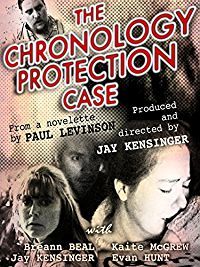
not free, but available in paper or all-electric Kindle
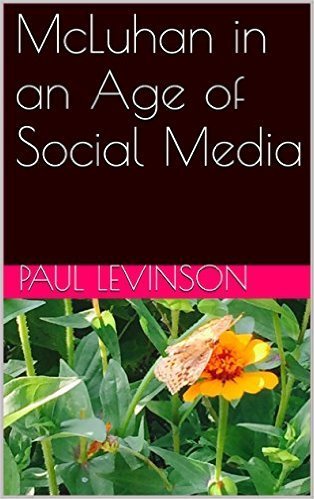
Paul Levinson's books ... Paul Levinson's music
Published on June 04, 2017 22:57
House of Cards Season 5: Reality Less Alternate
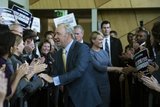 Well, it's obvious that with Trump in the White House, the alternate reality that House of Cards is with Frank Underwood as President is a lot less alternate than it was last year, in Season 4, with Obama in the White House on our nonfictional television screens. Indeed the only big difference between Trump and Frank is that Trump has not actually murdered anybody - by his own hand or by order - and I'm not sure how much money I would bet on that, especially the latter.
Well, it's obvious that with Trump in the White House, the alternate reality that House of Cards is with Frank Underwood as President is a lot less alternate than it was last year, in Season 4, with Obama in the White House on our nonfictional television screens. Indeed the only big difference between Trump and Frank is that Trump has not actually murdered anybody - by his own hand or by order - and I'm not sure how much money I would bet on that, especially the latter.That said, however, Frank Underwood is a vastly more literate and likely intelligent man that the current winner of the Electoral College vote. Frank has a grasp of history so astute that he knows that Jefferson not Washington was the author of a famous statement. One gets the impression that Trump won more from dumb luck that brilliant planning, which is precisely the opposite of how Frank has climbed to the top.
In previous seasons, we've seen Frank first work his way into the Vice Presidency, and then into the Presidency, culminating with a knock on the desk in the Oval Office, and a trail of bodies and broken lives in his wake. He does the same in the first half or so of Season 5, holding on to the Presidency in the face of a JFK-like Republican challenge. I don't know if I find the way he did it - manipulating the governors of Tennessee and Ohio to close their polls, due to a terrorist threat that Frank fabricated - completely plausible, but it worked in the narrative.
Even less plausible is Frank withdrawing in favor of his VP wife Claire, on her promise that she'll grant him a pardon (which of course she doesn't - at least not when she says she will - which nicely sets up the next season). Claire has really come into her own as almost or even every bit Frank's equal in this season, with a new hairdo about halfway through that makes her look more like Megyn Kelly than Mika Brzezinski, and killing her lover Tom literally in flagrante delicto with her on top, which puts her not only in Frank's class but a significant step above.
But I don't completely buy Frank resigning because he thinks the truest power resides outside the White House, not to mention that he had to have seen that Claire's promise of a pardon could be broken. So I'll be eagerly awaiting the next installment of this alternate reality, which begins sometime after Al Gore conceded and then withdrew his concession in 2000, which Frank aptly cites.
And it will be fun to see how the two new enigmatically powerful advisors whose loyalty to Frank or Claire is unclear - gamely played Campbell Scott and Patricia Clarkson - all works out.
See also House of Cards Season 1: A Review ... House of Cards Season 2: Even Better than the First, and Why ... House of Cards Season 3: Frank, Claire, "Putin," and Superb ... House of Cards Season 4: Trump and Frank
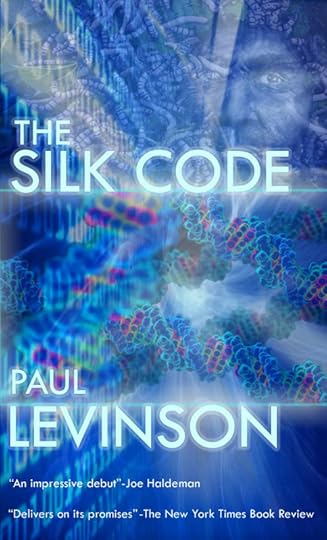
Paul Levinson's books ... Paul Levinson's music
Published on June 04, 2017 11:00
June 2, 2017
Review of Rob Sheffield's Dreaming The Beatles 5 of X: The Power of Yeah
 Rob Sheffield's short chapter in his Dreaming the Beatles (actually, they're all short, which is good) is about "It Won't Be Long," and is about as fine a piece of music journalism, or rock 'n' roll analysis, or whatever you want to call it, as you can find. It's a holographic sample of why the book as a whole is so enjoyable and important.
Rob Sheffield's short chapter in his Dreaming the Beatles (actually, they're all short, which is good) is about "It Won't Be Long," and is about as fine a piece of music journalism, or rock 'n' roll analysis, or whatever you want to call it, as you can find. It's a holographic sample of why the book as a whole is so enjoyable and important.The mini-essay begins with a meditation or disquisition on the role of yeahs in this song in particular and the Beatles music in general, replete with a count of the number of yeahs in this song, and which one is Sheffield's favorite (I've long agreed with his choice).
But it quickly turns out that this chapter is not about yeahs but about the Beatle's love of American girl groups, ranging from Rosie and the Originals (I love their "Angel Baby" so much I from time to time listen to the dozen or more excellent covers on YouTube) through the Shirelles, the Motown girl groups, and of course the Ronettes. (The first piece of music journalism I remember ever being impressed with was a review - maybe in one of the student newspapers - of the Ronettes' appearance at CCNY, where I was a student, around 1964, and how the jeans of every guy in the audience tightened as Ronnie began singing and moving.)
The Beatles expressed their admiration of these groups by injecting the girl groups' vitality into their (the Beatles') yeahs. And in a brilliant analysis of a single line - one of Sheffield's specialities - he explains why the Beatles concluded "It Won't Be Long" with the line "Till I belong to you" rather than the more expected "Till you belong to me": it's because the former is what a girl group would sing.
There's Brill Building, Ellie Greenwich (I mentioned my connection to her in my first review of this book), and all kinds of things that show Sheffield is adept not only in understanding the Beatles but the music that inspired them, and which they incorporated and ultimately built upon rather (than is often wrongly said) they replaced.
The next chapter is about why Ringo was crucial - and that deserves a review of its own, to come as soon as I've read the chapter, which won't be long, yeah.
See also Review of Rob Sheffield's Dreaming the Beatles 1 of X: The Love Affair ... 2 of X: The Heroine with a Thousand Faces ... 3 of X: Dear Beatles ... 4 of X: Paradox George Paul Levinson's books ... Paul Levinson's music
Published on June 02, 2017 15:21
June 1, 2017
Bloodline Season 3: Peak Shoreline
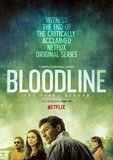 My wife and I saw the third season on Bloodline on Netflix the past few nights. It's especially good to see on Cape Cod, where the shoreline at the foot of our stairs has a lot in common with the shore that's the swaying backbone of Bloodline. But Bloodline's especially good to see anytime, being, as it is, one of the finest narratives ever to be on any kind of television screen.
My wife and I saw the third season on Bloodline on Netflix the past few nights. It's especially good to see on Cape Cod, where the shoreline at the foot of our stairs has a lot in common with the shore that's the swaying backbone of Bloodline. But Bloodline's especially good to see anytime, being, as it is, one of the finest narratives ever to be on any kind of television screen.I don't usually start my reviews with the acting, but it was a tour de force, across the board, in Bloodline. We've been Kyle Chandler fans since Friday Night Lights, but he put in a performance in Bloodline which in some ways exceeded that, given the intensity of torment in his lead character, John Rayburn. Norbert Leo Butz as John's younger brother Kevin was also superbly memorable, playing a character who is somehow even more complex and realistic, a package of weaknesses and surprising strengths impossible to classify.
When Sally - also wonderfully played by Sissy Spacek - surprisingly lashes out at John at the end (no doubt born of her hated over what he did to her beloved Danny), Kevin suddenly becomes the wiser, protective brother, telling John he doesn't have to absorb this abuse. Unlike John, who's too damaged to keep his wife and family together, Kevin is able to grow into being a father, and even tell his wife the truth about the family she has married into.
On that note, I would have rather seen a different ending - hopeless romantic that I am, I think Kevin and his wife and baby deserved better. But the Rayburns are manifestly never ever about happy endings.
The storyline has all kinds of shockers, my favorite being the role of the coroner in the early episodes of this final season. Even the smaller roles are top-notch, with great work by Beau Bridges and Melvin Van Peebles and Ben Mendelsohn. It was also good to see David Zayas, almost reprising his police role from Dexter, and Linda Cardellini as sister Meg Rayburn.
But back to the storyline - not only would I have liked to see a slightly different ending, I'd be much happier if this was not an ending to the series at all. There are all kinds of questions hanging, not only what John says to his nephew Nolan (Danny's son) on the dock, but the source of the same dream John, Kevin, and Meg are having, and what exactly happened on the boat years ago with Roy and Robert. So here's a plea to show creators Glenn and Todd Kessler, and Daniel Zelman, and Netflix, for at least one more season (hey, their superb Damages had five).
The sun is high, the water's just right, so I'm going for a walk by the bay, and thinking how good it would be if we could see another season of Bloodline up here next year.
See also Bloodline Season 1: Mainlining Family ... Bloodline Season 2: Darker Maybe Even Better than the First

Paul Levinson's books ... Paul Levinson's music
Published on June 01, 2017 09:41
May 31, 2017
The Americans Season 5 Finale: The Little Things
 Well, in an excellent season 5 finale last night, The Americans resorted to a chestnut of many a classic piece of fiction: with the main wheels of motion all taken into account on what looks like a major move or development, everything changes because of one little detail that we haven't been paying too much attention to.
Well, in an excellent season 5 finale last night, The Americans resorted to a chestnut of many a classic piece of fiction: with the main wheels of motion all taken into account on what looks like a major move or development, everything changes because of one little detail that we haven't been paying too much attention to.Kim and her father were barely in the story this season. There's a good scene in the finale of Philip in disguise saying goodbye to her - goodbye because he and Elizabeth have definitely decided to go back to the USSR. But, as Philip is going over what he thinks will be his last round of surreptitious recordings of Kim's father, he discovers something which Elizabeth and even Philip agree just can't let them leave just now: Kim's father is moving up to be head of the U. S. anti-Soviet spying division.
It's a good thing, too, that our point-of-view couple aren't leaving, because Henry's acceptance by that high-class prep school and Philip's sudden reversal on that - because Philip still thought at that time that they were leaving - was left hanging like worse than a big hangnail last night, with no easy resolution. So Philip and Elizabeth's staying at least will allow Henry to go off to school.
In a significant parallel, Stan is also talked out of leaving his division of the FBI by Renee, which pokes at another significant question that Philip and Elizabeth and we the audience haven't yet resolved: is she just Stan's good fortune, or is she another Soviet spy, called in to get what she can from Stan? It will be fun to see how that plays out next season.
And last but not least: good to see Martha edging toward some happiness in Moscow, as her translator introduces her to the possibility of adopting a Soviet orphan girl. "We want you to be happy," he says to her, revealing a surprising humanity in the Soviets, which we had seen previously only in Gabriel (and of course Philip).
And I'll see you all here with reviews of the final season next year.
See also The Americans 5.1: The Theft ... The Americans 5.2: Oleg and Stan ... The Americans 5.3: Cowboys and Bugs ... The Americans 5.4: Dating, Soviet-Spy Style ... The Americans 5.5: Wrong about the Bugs ... The Americans 5.7: Gabriel ... The Americans 5.9: Gabriel and Martha ... The Americans 5.10: That Pastor, Again ... The Americans 5.11: Execution in Newton ... The Americans 5.12: Back in the U.S.S.R.
And see also The Americans 4.4: Life and Death ... The Americans 4.6: Martha, Martha, Martha ... The Americans 4.8: Whither Martha? ... The Day After The Americans 4.9 ... The Americans 4.10: Outstanding! ... The Americans 4.11: Close Call ... The Americans 4.12: Detente and Secret History
And see also The Americans 3.1: Caring for People We Shouldn't ... The Americans 3.3: End Justified the Means ... The Americans 3.4: Baptism vs. Communism ... The Americans 3.6: "Jesus Came Through for Me Tonight" ...The Americans 3.7: Martha. My Dear ... The Americans 3.8: Martha, Part 2 ... The Americans 3.10: The Truth ... The Americans 3.12: The Unwigging ... The Americans Season 3 Finale: Turning a Paige
And see also The Americans 2.1-2: The Paradox of the Spy's Children ... The Americans 2.3: Family vs. Mission ... The Americans 2.7: Embryonic Internet and Lie Detection ... The Americans 2.9: Gimme that Old Time Religion ...The American 2.12: Espionage in Motion ... The Americans Season 2 Finale: Second Generation
And see also The Americans: True and Deep ... The Americans 1.4: Preventing World War III ... The Americans 1.11: Elizabeth's Evolution ... The Americans Season 1 Finale: Excellent with One Exception

Paul Levinson's books ... Paul Levinson's music
Published on May 31, 2017 11:24
May 30, 2017
Review of Rob Sheffield's Dreaming The Beatles 4 of X: Paradox George
 I don't want to get too far into Rob Sheffield's addictive book without posting another review, so I thought I'd check in here after finishing a chapter on George, which comes after discussions of Ringo (which I talk about in my last review) and Paul and John, which are of course a part of every chapter.
I don't want to get too far into Rob Sheffield's addictive book without posting another review, so I thought I'd check in here after finishing a chapter on George, which comes after discussions of Ringo (which I talk about in my last review) and Paul and John, which are of course a part of every chapter.Sheffield in effect tells us that George is the Beatle he most identifies with, mostly or most likely because George was a Beatles' fan, too (before and during George's tenure as a Beatle). This of course raises the question of who is your favorite Beatle - or, what Beatle or Beatles produced work that you most admire. And this gets at the very heart of everyone's experience with the Beatles. For me, I always found George's contribution almost impossible to gauge in comparison to John and Paul's. Although some of George's songs - both as a Beatle (Taxman, While My Guitar Gently Weeps) and after (All Things Must Pass) are among my all-time favorite songs/recordings, period, I still see him as a little below Paul and John because their contributions were either somehow even a little better, or definitely more numerous (She Said, Penny Lane, Across the Universe, every Lennon-McCartney song on Rubber Soul for starters).
So George is in the paradoxical position of being at the top of the human game of music, yet still being secondary, at least in my mind, to John and Paul. Further, there's no doubt in my mind - and I'm sure everyone else's - that The Traveling Wilburys were light-years better than Wings, even though Wings was great, and this is not a shot against Linda or Denny Laine. The Wilburys were astonishing in significant part because of George's songwriting, and the sound he contributed to this superstar group, which often sounds just like him.
Sheffield also notes that George's fame as the "Underrated Beatle ... raises the question of how famous it's possible to get for being overlooked and still qualify," which is a great example of another kind of paradox, and one that deepens our difficulty in understanding and evaluating George and his contribution. Ringo became and is still very famous, too, but there's nothing paradoxical about that, since no one would consider him "underrated".
Sheffield quotes John in 1980, about how George before the Beatles used "to follow me" after school, "hovering around like those kids at the gate of the Dakota now". Quotes like that can bring you to tears, not only because of what would soon happen to John, but because George died far too early, too.
The Beatles Channel and books like Sheffield's can provide some measure comfort. But there's not a day that goes by when I don't wish that all four of The Beatles were still around.
And I'll be back soon with more.
See also Review of Rob Sheffield's Dreaming the Beatles 1 of X: The Love Affair ... 2 of X: The Heroine with a Thousand Faces ... 3 of X: Dear Beatles
Paul Levinson's books ... Paul Levinson's music
Published on May 30, 2017 14:12
May 28, 2017
Twin Peaks: The Return 1.3.-4: Coffee and Cole
 The second installment of Twin Peaks: The Return - aka episodes 3 and 4 - continued tonight in the unmitigated gonzo, steampunk, B-movie style to which we became accustomed last week.
The second installment of Twin Peaks: The Return - aka episodes 3 and 4 - continued tonight in the unmitigated gonzo, steampunk, B-movie style to which we became accustomed last week.Let me also say that one of the high points - perhaps the highest points - of David Lynch's work have been the singers on stage at one point or another in the narrative. The Dean Stockwell character lip synching Roy Orbison's "In Dreams" in Blue Velvet, with Dennis Hopper's self-tortured character trying to sing along but taking the needle off the record, and Kyle MacLachlan's character in shock in the small, standing audience in the room, was so powerful that I've wanted to write a book about that scene as a transcendent moment in popular culture for years. As it is, it's easily one of the best scenes in any movie.
Performances of original songs by unknown (to me) musicians and singers have ended every episode of Twin Peaks: The Return so far, and they've all been excellent. But that Everly Brothers-like performance at the end of 1.3 was superb and to my ears and eyes already a classic.
Back to Kyle MacLachlan, the central story in episodes 1.3-4 was Agent Cooper's return to this planet. It's unsurprisingly no easy return. Part of the difficulty makes sense. Cooper can't talk or think normally because he's been in that insane, other-dimensional room for 25 years. Part of it, like all Lynch works, doesn't - or doesn't quite make sense. Apparently, Cooper was "tricked," and his doppelgänger is still out and about on Earth, though soon locked up. But the real Cooper seems to be making at least a little bit of progress, responding well to a cup of coffee in the morning, put on his breakfast table by his doppelgänger's wife (played by Naomi Watts, who starred in Mulholland Drive, generally recognized as David Lynch's second-best work - high praise - and I agree).
And speaking of Lynch, it was good to see him return as FBI Deputy Director Cole these two episodes (he was actually an FBI Regional Bureau Chief in the original), which got me thinking: how about Cole as Comey's replacement, now that Lieberman has bowed out?
Hey, if that actually happened, it would be a lot less strange than some of the developments in Twin Peaks: The Return, which I'll be back to offer a few more paragraphs about next week.
See also Twin Peaks: The Return 1.1-2: Superluminal Sans Cherry Pie
FREE on Amazon Prime
Available on Prime

Paul Levinson's books ... Paul Levinson's music
Published on May 28, 2017 21:32
Sense8 Season 2: Sense8tional
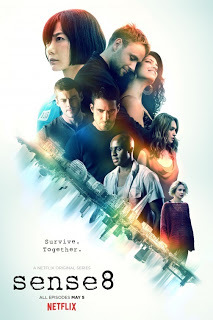
I realized a while ago that binge-watching, like all human activities, isn't the perfect strategy for all television watching. It's almost never preferable to wait a week before the next episode of a compelling series is available, but sometimes watching a complete season in one or two seasons is not the best way to go, either. Sometimes you want to savor each episode a little longer, let it slosh around in your mind a little, until it settles into some place or maybe keeps quietly percolating.I'd intended to watch all of Sense8 season 2 in one swoop - that is, all the episodes after the Christmas special which aired late last year - but decided, after the first two new episodes (2.2-3), that I wanted it to last a little longer.We saw and learned lots of things in these two episodes. Among the most profound is that when one of the cluster is nearly hung -- that is, nearly choked to death at the end of the rope - the other members of the cluster start to lose consciousness, too. This raises a crucial question: if Sun had indeed died in that noose -- if her cellmate hadn't rescued her (in a great scene) -- would the rest of the cluster had died, too? I can't recall exactly what happens when one of the cluster falls asleep, but my impression is the others, though aware that one member is sleeping, stay awake. If that's the case, why would the near-killing on Sun so viscerally affect the rest of the cluster?The question is whether the effect is just mental, or physical as well. Of course, mental and physical are always intertwined -- what we think and feel in our heads inevitably affects our bodies -- but in the case of the sense8s, is this so much in play that the violent death of one will kill the others? I'd think not, but if this possibility remains open, our sense8s are even more vulnerable than we realized.But they're making good progress in these two episodes -- Sun is free, Whispers is set back, and the sense8s continue to bring their talents to bear when one or two of them needs help, even in a difficult conversation with reporters. And we're beginning to learn more about homo sensorium, and the deeper evolutionary significance of the sense8s.***One of the most significant secondary themes of Sense8 is the personal relationships our sense8s have to sapiens, as we humans are now increasingly known and referred to in the series. These range from significant other partnerships, as in Lito and Hernando, Nomi and Amanita, and Kala and her devoted but lackluster husband, to lifelong friends such as Wolfgang and Felix, to mortal enemies as in Sun and her monster-in-sheep's-clothing brother.
These couplings in effect represent the hope and perils for sense8/sapiens on the planet-wide, species level. So far, we've seen only the perils for sense8s, and the general unawareness that our species has about the very existence of sense8s. But, as of the end of episode 2.5, that appears set to dramatically change.
In some ways even more crucial to the story are the relationships members of our cluster have to other sense8s. The decision to go public as a way of vanquishing their mortal enemies stems from Will's realization that there must be, if not a myriad of sense8s, a number large enough to attract such powerful enemies.
My favorite new sense8 in season 2 is Lila, and not only because she appears totally nude in an attempt to seduce Wolfgang. She earlier tempts Wolfgang when he's telepathically communicating with Kala, providing a fine example of a simmering, tempestuous triangle, totally sense8-style. Love flows in all kinds of ways in this story.
***
Every action movie, every police drama, every thriller needs a shootout. Since Sense8 is all three and much more, it gets a one-of-a-kind, multi-valent shoutout in 2.6, and it's a thing of violent beauty to behold.The cinematography, always a splendid eyeful in Sense8, is especially good in that bar, where it all begins with Wolfgang and Lila across the table. Her new seduction attempt erupts into a gunfight, between Wolfgang and Lila in physical space, and their clusters whirling like dervishes and firing away in mental space at every opponent they can see. The shots of the two clusters, menacingly walking behind their live anchors, drawing closer together, almost into a single line, then spreading apart and shooting, makes for a veritable gunfight at the OK coral, Sense8-style.Just to be clear -- though that's never really completely possible, given the speed of thought and the inherent multiplicity of the story -- there are players in the bar who are on Lila's team (though whether sense8 or sapien not completely clear). So Wolfgang is physically outnumbered, and he and his/our cluster have to fight not only Lila but other physical people in the room bent on killing him.The upshot: both Wolfgang and Lila survive, and we learn that locating other clusters can just as easily be death as salvation for our sense8s. Not only are some sapiens out to kill sense8s, but some sense8s are out to kill our sense8s, too.At some point, not in the bar, another sense8 not in our cluster remarks that sapiens invented Google in the 1990s, but sense8s were instantly communicating worldwide (what Marshall McLuhan and I would call a global village) back in prehistoric times. Earlier this season, someone explained that just as homo sapiens exterminated Neanderthals, so our kind sought to eradicate homo sensoriums aka sense8s.Which got me thinking -- what if in our reality, some Neanderthals had survived? Hmm ... there's an idea for a novel.***Sense8 season 2 came to a cliff-hanging, mid-scene conclusion, with a smart turning-of-the-tables on the sense8 strategy in their battles against sapiens and sense8s.That strategy, deployed throughout the series, and one of the key and especially enjoyable mechanisms of the story, entails one sense8, under physical attack or in some kind of social crisis, deploying the talents and powers of the other seven sense8s to succeed or at least get an upper hand. In the final few episodes, we see this done to excellent effect in one of the best scenes of the series -- a car chase -- as Sun tries to put away her evil brother. And we see what happens when one of the sense8s -- Will -- is not able to pour his talents into the action, as Capheus almost loses his life in a campaign-rally riot in Kenya.So it was particularly smooth to find that Will's declaration of war on BPO and Whispers is a physical declaration, with Will and the other six sense8s and their allies literally on the way to mounting an in-person attack in their efforts to free Wolfgang. It begins with Will surprising and getting the better of Whispers by being actually physically in the room with him, and ends with ... well, we'll need to wait for Season 3.One question is why doesn't Will just kill Whispers and be done with it, but part of the answer to that is that people - that is, sense8s - don't seem to completely die in Sense8. In fact, not only do they not die, but they seem to change sides -- reverse loyalties -- in a way that harkens back to one of the mainsprings of the Dune saga.I've seen it said that Sense8 is enjoyable if you don't pay too much attention, but I'd say it's just the opposite: the complex, multi-dimensional and multi-layered narrative works best when you give its elements careful consideration. Indeed, one of the joys of the second season, which I thought was better than the first (high praise, since I liked that one, too), is that it is beginning to uncover some of what Noam Chomsky might call the deep structure of sense8 grammar.And I'll be back here some time in the future with reviews of season 3.

See also Sense8: Vibrant, Profound, Dangerous ... Sense8 2.1-2: The Mental, The Digital, and The Palpable Paul Levinson's books ... Paul Levinson's music
Published on May 28, 2017 13:01
May 27, 2017
Review of Rob Sheffield's Dreaming the Beatles 3 of X: Dear Beatles
 In the next chapter of Rob Sheffield's Dreaming the Beatles - I just realized that the chapters are not numbered, which means that each chapter is a piece of a hologram, a snapshot of the whole, like a verse in many a song - we get a deconstruction of "Dear Prudence," which Sheffield holds to be one of The Beatles' best, and I agree (though they have so many bests the term hasn't the usual meaning for me).
In the next chapter of Rob Sheffield's Dreaming the Beatles - I just realized that the chapters are not numbered, which means that each chapter is a piece of a hologram, a snapshot of the whole, like a verse in many a song - we get a deconstruction of "Dear Prudence," which Sheffield holds to be one of The Beatles' best, and I agree (though they have so many bests the term hasn't the usual meaning for me).The gist is that the song, contrary to what we think we know about it, isn't about the real Prudence Farrow (Mia's sister, in India with the Beatles) at all. It's really about the Beatles themselves (note: I'm on Cape Cod, and lazier than usual, so I'm not going with the capital T). When the Beatles sing can you come out to play, they're really beseeching themselves, not Mia's sister. And, in a particularly effective acoustic point by Sheffield, when the Beatles sing look around, they're looking for Ringo, who had just quit the group (I heard that questing harmony in my head when I read Sheffield's words).
Now, every song that anyone has ever written is really more about the writer than the subject of the song, and Sheffield has to know that. So what he's saying here is not a truism, but a penetrating piece of Beatles biography: the Beatles were on the verge of breaking up when Lennon wrote and John, Paul, and George recorded the song (with Paul not Ringo on drums, as Sheffield explains). And the three very much didn't want to lose Ringo, because they saw that on some level as losing themselves. The result: well, Ringo came back (because of a letter not the song), but his leaving was prelude to the real break-ups ahead.
Which raises a question that Sheffield has not (yet) addressed, but which always occurred to me. Why did the Beatles so value Ringo? In their letter, they tell him he's the greatest rock 'n' roll drummer, but that's probably not true. But John, Paul, and George saw him as essential to their band and I've always wondered why.
Not that I would have rather seen any other drummer with the Beatles. The band including Ringo was every bit as remarkable and unique and towering in importance as Sheffield says. But - Ringo didn't write many or any of their songs, didn't sing much if any harmony, sang leads that were enjoyable enough but not extraordinary (though I've always considered his "Back Off Boogaloo" - which he not only sang but wrote - one of the best post-Beatle songs). So what magic, then, did Ringo somehow contribute?
The song - I'm still on "Back Off Boogaloo" - was supposed to be a shot at Paul, which Ringo denied, but I've always agreed with I. A. Richards' thesis that the author is the last person you should ask about the meaning of a work. Which is another reason that Sheffield's analyses of the real meaning of "Dear Prudence" and other Beatles songs is so appealing,
And I'm off for Cape dinner, and will be back with more soon.
See also Review of Rob Sheffield's Dreaming the Beatles 1 of X: The Love Affair ... 2 of X: The Heroine with a Thousand Faces
Paul Levinson's books ... Paul Levinson's music
Published on May 27, 2017 16:29
Levinson at Large
At present, I'll be automatically porting over blog posts from my main blog, Paul Levinson's Infinite Regress. These consist of literate (I hope) reviews of mostly television, with some reviews of mov
At present, I'll be automatically porting over blog posts from my main blog, Paul Levinson's Infinite Regress. These consist of literate (I hope) reviews of mostly television, with some reviews of movies, books, music, and discussions of politics and world events mixed in. You'll also find links to my Light On Light Through podcast.
...more
- Paul Levinson's profile
- 342 followers



